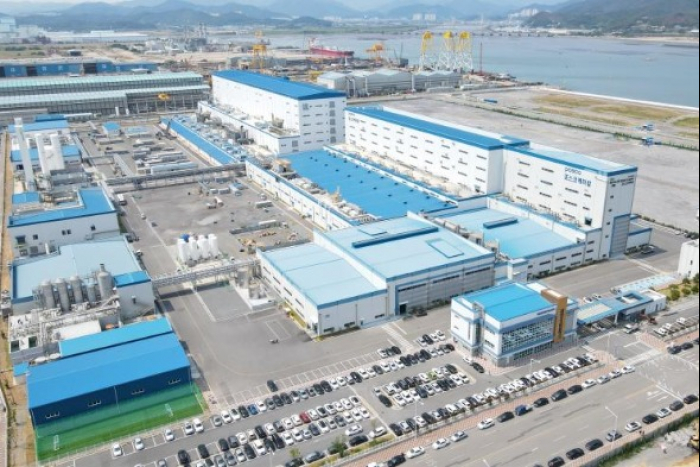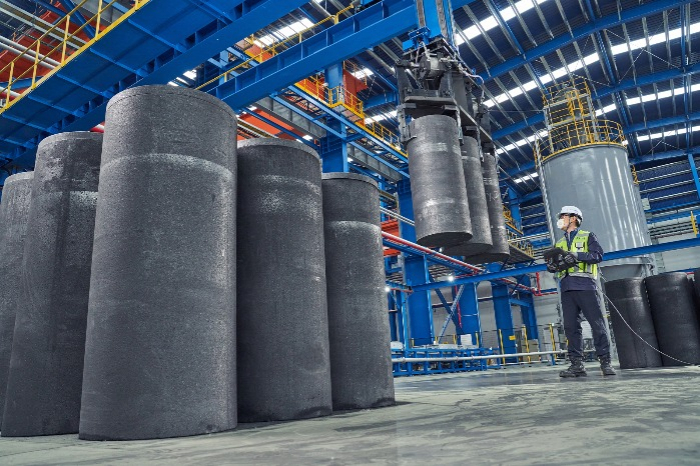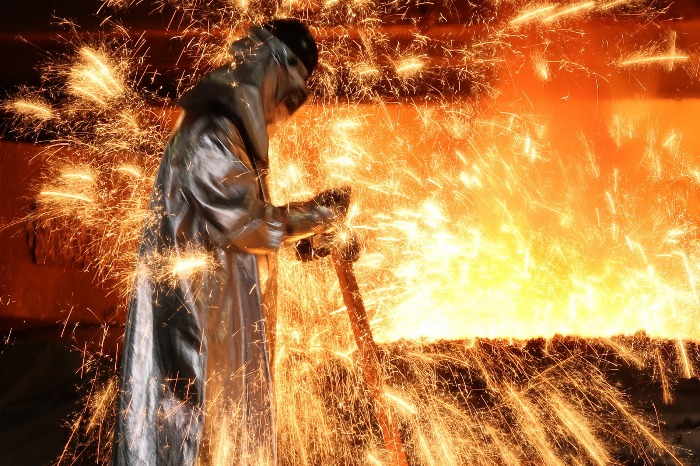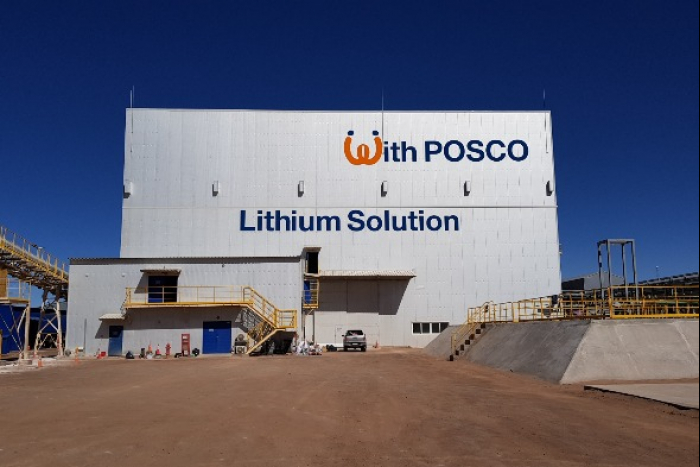POSTECH hits jackpot with stakes in POSCO companies on battery boom
S.Korean steel giant POSCO’s research university has earned 1.5 trillion won in equity gains from its holdings in POSCO affiliates
By Apr 17, 2023 (Gmt+09:00)
LG Chem to sell water filter business to Glenwood PE for $692 million


KT&G eyes overseas M&A after rejecting activist fund's offer


Mirae Asset to be named Korea Post’s core real estate fund operator


StockX in merger talks with Naver’s online reseller Kream


Meritz backs half of ex-manager’s $210 mn hedge fund



Pohang University of Science and Technology (POSTECH), set up by South Korea’s steel giant POSCO Group in 1986 as a research university in the country, is the true winner in the recent EV boom-driven POSCO affiliates’ rally, with a windfall gain of 1.5 trillion won ($1.1 billion) from its equity holdings in POSCO stocks.
According to a regulatory filing on Monday, the equity value of POSTECH’s stake holdings in POSCO Group’s four listed companies stands at about 1.7 trillion won. The Korean research university originally purchased the shares at 245 billion won.
POSTECH currently holds a 2.34% stake in POSCO Holdings Inc., 2.81% in POSCO Future M Co., 0.78% in POSCO DX Co. and 0.1% in POSCO International Corp., according to the data.
POSTECH started investing in POSCO stocks in 2000 when the steel giant parent donated 300 billion won to the university.
The research university’s jackpot is largely attributed to the recent EV boom that has helped POSCO regain its attractiveness after its upheaval as the symbol of sunset industry steelmaking.
POSCO SHINES AGAIN
According to the Korea Exchange (KRX) on the same day, the total market capitalization of POSCO’s six listed companies skyrocketed 80.4% to 75 trillion won ($57.2 billion) from 41.6 trillion won on Dec. 29.
Driving this leap is the upbeat outlook for the EV battery market on the EV boom, leading investors to gobble up shares of the steel giant’s companies in the EV battery value chain, according to market analysts.
Shares of POSCO Future M Co., formerly POSCO Chemical Co., which produces lithium-ion battery’s two core materials cathode and anode, surged 113.7% over the same period, while aluminum deoxidizer producer POSCO M-Tech Co. and coated and color steel sheets provider POSCO Steeleon Co. zoomed 310% and 87.6%, respectively.

POSCO Future M is the only Korean company currently able to produce both cathode and anode.
POSCO International Corp. in charge of exploring natural resources, including EV battery’s core material lithium, leaped 91.2%, and POSCO DX Co., formerly POSCO ICT Co. responsible for IT services, robotics and automation technology development in the steel group, soared 149.6%.
The steelmaker’s holding company POSCO Holdings Inc. rallied 53.2% over the cited period to end at 423,500 won on Monday.
Retail investors are the main force behind their flight. According to the KRX data, POSCO Holdings topped the list of stocks net purchased by retail investors to date this year after mom-and-pop investors net bought 3.6 trillion won worth of the stock.
POSCO is making a triumphant return to the Korean stock market after it lost ground to current bellwether semiconductor leader Samsung Electronics Co. and auto giant Hyundai Motor Co.

The EV boom, however, has come to rescue it and its subsidiaries, making investors shift their focus to POSCO’s new bets on the secondary battery business.
POSCO Chemical, now POSCO Future M, in 2010 entered the battery materials market with the acquisition of LS Mtron Co.’s anode business and then the cathode business in 2019.
POSCO uses lithium from Argentina and Australia, as well as nickel from New Caledonia, Australia and Indonesia on multiple long-term supply deals to produce cathodes and anodes, which are supplied to LG Energy Solution Ltd. and Samsung SDI Co., major global EV battery players.
It has already secured more than 40 trillion won worth of orders for both materials so far this year.

POSCO Group’s battery businesses cover nearly all the EV battery value chain, except battery cell making. It plans to advance into the waste battery recycling business through a joint venture to be built with GS Energy Corp. in October.
“POSCO with an established supply chain of minerals found only in certain areas and smelting technology is in the center (of the EV battery industry),” said Ha In-hwan, an analyst at KB Securities Co.
Write to Eui-Myung Park and Sang Hoon Sung at uimyung@hankyung.com
Sookyung Seo edited this article.
-
 Corporate strategyPOSCO International to transform into green company by 2030
Corporate strategyPOSCO International to transform into green company by 2030Apr 13, 2023 (Gmt+09:00)
1 Min read -

-
 EnergyPOSCO International, Pertamina win gas exploration rights off Indonesia
EnergyPOSCO International, Pertamina win gas exploration rights off IndonesiaFeb 23, 2023 (Gmt+09:00)
2 Min read -
 BatteriesPOSCO Chemical breaks ground on second anode material plant
BatteriesPOSCO Chemical breaks ground on second anode material plantFeb 01, 2023 (Gmt+09:00)
1 Min read -
 BatteriesPOSCO Chemical completes world's largest cathode materials plant
BatteriesPOSCO Chemical completes world's largest cathode materials plantNov 10, 2022 (Gmt+09:00)
1 Min read -
 EarningsPOSCO Chemical posts record third-quarter sales, operating profit
EarningsPOSCO Chemical posts record third-quarter sales, operating profitOct 24, 2022 (Gmt+09:00)
1 Min read -
 BatteriesPOSCO Holdings to invest extra $1.1 billion in Argentine lithium plant
BatteriesPOSCO Holdings to invest extra $1.1 billion in Argentine lithium plantOct 11, 2022 (Gmt+09:00)
2 Min read -
 BatteriesPOSCO Chemical wins $10.6 billion cathode order from General Motors
BatteriesPOSCO Chemical wins $10.6 billion cathode order from General MotorsJul 29, 2022 (Gmt+09:00)
1 Min read -
 BatteriesPOSCO Chemical, Britishvolt sign initial deal for battery materials
BatteriesPOSCO Chemical, Britishvolt sign initial deal for battery materialsJun 30, 2022 (Gmt+09:00)
1 Min read -
 Electric vehiclesPOSCO International signs parts supply deal with US EV startup Rivian
Electric vehiclesPOSCO International signs parts supply deal with US EV startup RivianDec 02, 2021 (Gmt+09:00)
1 Min read


